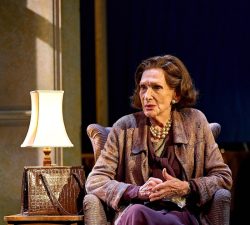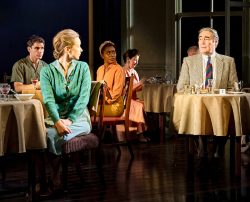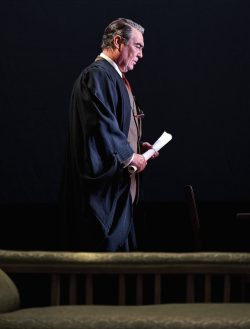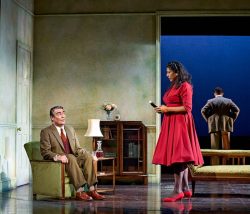 TERENCE Rattigan’s popularity and fame fell victim to the “big new thing” of the mid-50s – the Kitchen Sink Drama that flowed from the Royal Court Theatre in Chelsea. The time from Rattigan as the most highly paid screenwriter in the world to his relegation as “old hat” was brief, and his restoration has been slow.
TERENCE Rattigan’s popularity and fame fell victim to the “big new thing” of the mid-50s – the Kitchen Sink Drama that flowed from the Royal Court Theatre in Chelsea. The time from Rattigan as the most highly paid screenwriter in the world to his relegation as “old hat” was brief, and his restoration has been slow.
But thanks to some outstanding revivals in recent years his reputation is riding high again, and its ascent will be aided by the beautifully paced and acted pairing of Table Number Seven (part of Separate Tables) and The Browning Version, now at Bath Theatre Royal and off on a UK Tour. It follows the stunning Lindsay Posner production of The Deep Blue Sea at the Ustinov in May this year, on its way into London in May next year.
Director James Dacre paired the short plays for the first time, and seeing them together highlights Rattigan’s profound empathy and understanding of human nature. These are two stories of ordinary people, each of them extraordinary and unpredictable, subconsciously waiting for some small thing to release them from their own insecurities and unhappiness.
 The Beauregard Private Hotel in Bournemouth, home to retired and elderly gentlefolk (as they used to be known), is the setting for the unfolding of the story of Major Pollock, a military man with the ties, badges and battle stories, but hiding a guilty secret from his often-bored living companions. There were many such hotels, and many people alone after the end of the war, in and around Bournemouth in the early 1950s … I could almost smell that combination of mothballs and gravy in Mike Britton’s atmospheric and very effective revolving dining room.
The Beauregard Private Hotel in Bournemouth, home to retired and elderly gentlefolk (as they used to be known), is the setting for the unfolding of the story of Major Pollock, a military man with the ties, badges and battle stories, but hiding a guilty secret from his often-bored living companions. There were many such hotels, and many people alone after the end of the war, in and around Bournemouth in the early 1950s … I could almost smell that combination of mothballs and gravy in Mike Britton’s atmospheric and very effective revolving dining room.
The Browning Version is a story of still-shocking cruelty, served out as an everyday answer to hidden but crippling frustration. The Crock – Andrew Crocker-Harris, teacher of the Lower V in a minor public school – is in his last day at school before leaving to teach at a “crammers” His own student brilliance has been subsumed by his social unease and his inability to “read the room.” Now it’s all over, and his wife of many years is making no secret of her real feelings for him.

 This new Bath Theatre Royal and Living Theatre production brings the powerfully subtle Nathaniel Parker to both roles, allowing him to create to very different men at crisis points in their lives. He is joined in Table Number Seven by Sian Phillips as Mrs Railton-Bell, a woman used to getting her own way at the same time as subjugating her nervous daughter. It is a performance that commands the stage but never overwhelms her fellow actors, who include the arch Miss Meacham (Richenda Carey), the wise Miss Cooper (Lolita Chakrabarti) and the “radical” Charles Stratton (Jeremy Neumark Jones). Lolita Chakrabarti returns as the casually cruel Millie Crocker-Harris in The Browning Version, where Bertie Hawes finds the perfect balance for the young student Taplow.
This new Bath Theatre Royal and Living Theatre production brings the powerfully subtle Nathaniel Parker to both roles, allowing him to create to very different men at crisis points in their lives. He is joined in Table Number Seven by Sian Phillips as Mrs Railton-Bell, a woman used to getting her own way at the same time as subjugating her nervous daughter. It is a performance that commands the stage but never overwhelms her fellow actors, who include the arch Miss Meacham (Richenda Carey), the wise Miss Cooper (Lolita Chakrabarti) and the “radical” Charles Stratton (Jeremy Neumark Jones). Lolita Chakrabarti returns as the casually cruel Millie Crocker-Harris in The Browning Version, where Bertie Hawes finds the perfect balance for the young student Taplow.
Nathaniel Parker, seen as Henry VIII in all three stagings of Hilary Mantel’s Wolf Hall trilogy, creates two poignant studies of typically English men of the post-war period, their emotions repressed and their actions bound by rigid social expectations. He captures Rattigan’s acute but understated observations and his lifelong battle against prejudice and intolerance.
The plays tour until mid March 2025.
GP-W
Photographs by Manuel Harlan